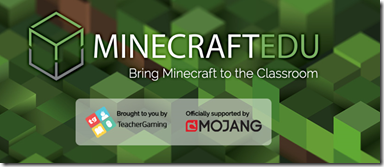I have always thought that my generation and younger generations had a slightly different learning ability then previous generations of learners. We grew up with videogames, and with videogames we learned. It seems odd, but yes, we learned from videogames. At the very basic level we learned hand-eye coordination, and at greater levels we learned shape and puzzle relations from games like Tetris and Dr. Mario. As gaming technology increased, so did the level of learning. I have concrete memories of Super Munchers and learning math and vocabulary, and most everyone knows the pain of dying of dysentery while playing a long game of Oregon Trail. Heck, if it wasn’t for Mario Teaches Typing, I wouldn’t be posting on this blog. While delving into the EdTech world, I am finding that video games can be used to a greater extent than ever.
I recently read a blog post on KQED's MindShift blog called, From Mars to Minecraft: Teachers Bring the Arcade to the Classroom. The author, Jordan Shapiro, writes about many current videogames that are being created specifically for learning purposes, "Consider Mars Generation One: Argubot Academy. Designed by GlassLab, in collaboration with NASA, the game is aligned with Common Core ELA standards and infused with STEM content. It focuses on teaching argumentation, and in particular, it focuses on how to use evidence to support claims.". Games such as this are reminiscent of the games of my youth, games such as Yukon Trail and Oregon Trail, however, now these games are specifically geared towards meeting the educational needs of students as well as the educational requirements of the state. "Mars Generation One: Argubot Academy is a role playing game that combines a space-age storyline about building a Mars colony with great animations.". While I do not teach this field of education whatsoever, I can imagine it is a hard topic to conceptualize with young students. A game such as this helps engage students in a subject that would have previously been lost on them.
Many teachers have begun to use MinecraftEDU in their classrooms. Shapiro writes, "MinecraftEDU provides a virtual world where teachers and students can build simulations with unlimited resources. When I was a student, we held mini-Renaissance Faires and built toothpick bridges. We were always limited by time, space, and resources.". Imagine a class learning about the impacts of climate change or city engineering, they can utilize Minecraft to model virtual 3D environments in which the criteria live and work.
Why am I sending my child to school to play video games?! I ask, why not? If students are learning at a greater capacity, and learning in a way that involves interactive experiences, I am all for utilizing video games in the classroom.
